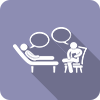- Can Cocaine Abuse and Addiction be Treated?
- Do I Need Cocaine Addiction Treatment?
- Types of Treatment
- Dual Diagnosis Treatment: What to Expect
- How to Chose the Best Cocaine Addiction Treatment
Cocaine Addiction and Abuse
Cocaine addiction is a complex
medical disorder that
adversely impacts the physical as well as psychological health of the user.
However, the loss of health is not the only harm resulting from cocaine addiction, as it is associated with various occupational, financial, familial, social and legal complications as well.
Can Cocaine Abuse and Addiction be Treated?
The answer is not straightforward. Cocaine continues to be one of the most commonly abused drugs and recent US trends indicate a consistent surge in its use. Cocaine addiction represents the interplay of multiple biological, psychological and environmental factors.
The very nature of cocaine addiction, as reflected in its bio-psychosocial underpinnings and the adverse impact in various domains of life, calls for an intervention strategy that is geared to address these diverse issues.
Therapists are Standing By to Treat Your Depression, Anxiety or Other Mental Health Needs
Explore Your Options Today
Ad
Efforts are being made to develop an effective medicine for cocaine addiction, and several medications have shown promise. Medicines can help alleviate the physical and psychological discomfort associated with quitting cocaine and manage the complications associated with cocaine addiction.
Effective treatment for cocaine addiction extends beyond the drug use and must address the different needs of the individual. For example:
- Motivational Interviewing has been effective in improving treatment retention and the motivation to quit cocaine use for those with low initial motivation.
- Contingency management (CM) has been found to improve abstinences from cocaine and increase attendance in treatment. It is a behavioral therapy that uses the positive reinforcement of tangible rewards to encourage and elicit desirable behavior in the context of a drug free lifestyle.
- Cognitive behavioral therapy (CBT) helps individuals identify, avoid and cope with high-risk situations that may trigger cocaine use and help one quit and remain abstinent. It has been shown to have comparable efficacy to CM with regards to treatment outcomes in long-term follow-up studies with cocaine dependent individuals.
- Family therapy helps ameliorate the impact of cocaine addiction on interpersonal relations. Initially, the focus is on improving the family dynamic by identifying and building on the strengths of family members.
Do I Need Cocaine Addiction Treatment?
Presence of one or more of these is a call to seek professional advice for a thorough evaluation of the problem.
 Don't suffer the effects of cocaine addiction one more day. Find a treatment center now.
Don't suffer the effects of cocaine addiction one more day. Find a treatment center now.
- Intense, irresistible, compulsive desire to use the drug.
- Experiencing tolerance, or a gradual increase in the amount of drug used because of a reduction in the effect experienced with previous amount.
- Appearance of withdrawals upon stopping or reducing the amount usually consumed. Symptoms include:
- Dysphoric mood.
- Fatigue.
- Insomnia or hypersomnia.
- Unpleasant dreams.
- Psychomotor retardation or activation.
- Cocaine addiction is also reflected in the daily routine of the user. You may have a problem if your day involves:
- Procuring cocaine, using and experiencing its effects.
- Neglect of other pleasures and responsibilities at school, home or work.
- Loss of control over the amount or pattern of use.
- Use that persists despite awareness of the harms associated with cocaine.
- Interpersonal difficulties consequent to cocaine use.
- Difficulties at the workplace or in school.
- Emergence of a mental disorder.
- Inadequate social support.
Types of Treatment
Treatment for cocaine addiction is offered in different settings. Based on the needs and requirements one can chose from these different treatment options.
Residential Treatment
 As suggested by the name, residential treatment for cocaine addiction requires one to stay at the treatment facility for the entire duration of the program.
As suggested by the name, residential treatment for cocaine addiction requires one to stay at the treatment facility for the entire duration of the program.
Residential treatments offer a safe and drug-free environment with medical support to manage detox and withdrawals.
After treatment, residential options like therapeutic communities offer a structured program where the individual remains at a residence for an extended period of time (usually 6-12 months).The residents play the roles of a client, role model, counselor, supervisor, and tutor passing through different stages of roles and responsibilities, to aid reintegration to society.
Inpatient Treatment vs. Outpatient Care
One can access treatment for cocaine addiction from inpatient as well as outpatient settings. The outpatient treatment involves specified periods of contact with the treatment team while staying at home and continuing with daily responsibilities.
The inpatient treatment is offered through a host of different setups. These include:
- Publicly funded addiction treatment centers.
- Private and luxury addiction treatment centers which offer top-notch amenities in luxurious locales.
- Executive addiction treatment centers have access to Internet, phone and meeting centers for clients who must continue meeting their professional responsibilities while getting treatment.
Also, inpatient treatment can be chosen by personal preference, as it offers longer periods of direct contact with treatment team and makes it relatively easy to stay away from the drugs, which may suit some individuals much better than others.
In general, inpatient or residential treatment is better suited for:
- Individuals with severe addiction.
- Co-morbid physical and mental disorders.
- Poor social support.
- Prior unsuccessful attempts at quitting through an outpatient treatment program.
Medically Assisted Cocaine Addiction Treatment
 Currently, there are no FDA approved medications for cocaine use and without a pharmacological component; psychological treatments (although effective) have limited long-term clinical utility.
Currently, there are no FDA approved medications for cocaine use and without a pharmacological component; psychological treatments (although effective) have limited long-term clinical utility.
There is considerable research on possible medications that are evaluated in terms of their effectiveness in actually reducing cocaine use, affecting craving and improving abstinence-related symptoms like sleep disturbances.
- Disulfram has been approved for treatment of alcohol dependence and research indicates that it reduces cocaine use and may inhibit some of the subjective reinforcing properties of cocaine.
- Modafinil also seems to be especially promising. It has stimulant like properties and has shown some efficacy in reducing cocaine related craving.
- Overall, the abuse liability of modafinil due to any reinforcing effects has been negligible and it also helps improve sleep patterns after abstinence from cocaine.
- Particularly, modafinil showed a decrease in cocaine use amongst cocaine dependent individuals with comorbid alcohol dependence.
Baclofen, tiagabine, topiramate, and vigabatrin are other medicines that have been found to reduce cocaine use in research studies. These drugs specifically influence GABA activty which has the potential to suppress or reduce the release of dopamine upon cocaine administration. However, ongoing randomized clinical trials are necessary to understand:
- Which outcomes these medications are most likely to reduce?
- Which sub-populations they are most effective in? And why?
TA-CD, a cocaine vaccine, is currently being studied and has shown mildly positive results in eliciting an 'immunological' response to the reinforcing effects of cocaine use. However, no conclusions can be made about long-term efficacy yet.
Counseling and Therapy
 Counseling and psychological therapies play a key central role in management of cocaine addiction.
Counseling and psychological therapies play a key central role in management of cocaine addiction.
These have been found to be of proven efficacy in helping quit cocaine use as well maintaining abstinence.
Examples include:
- Motivational interviewing helps one overcome barriers to change and take steps to quit cocaine.
- Cognitive behavioral therapy (CBT) helps identify, avoid and cope with high- risk situations that can put one at risk of lapse, and subsequently relapse.
- Contingency management (CM) also helps to promote drug free lifestyle by making tangible rewards contingent on desired behaviors.
- Community based self-help groups like Cocaine Anonymous can also be of help in supporting abstinence.
Partial Hospitalization and Intensive Outpatient (IOP)
 One can take advantage of the benefits of extended direct medical supervision without staying at the treatment facility for the entire duration of the treatment program through partial hospitalization.
One can take advantage of the benefits of extended direct medical supervision without staying at the treatment facility for the entire duration of the treatment program through partial hospitalization.
Those with a stable living arrangement and good social support are better suited for partial hospitalization where the contact with the hospital is usually for around 4-6 hours per day, 3-5 days a week.
If a job or other social responsibilities prevent someone from seeking inpatient treatment, there is still an option to avail more extensive medical care from outpatient through Intensive outpatient (IOP) program. Intensive outpatient requires time commitment of 2-4 hours a day, 3-5 days per week.
Dual Diagnosis Treatment: What to Expect
Individuals with cocaine addiction are at an increased risk of having co-occurring mental disorders.
Mood disorders (including depressive disorders), anxiety disorders and psychotic disorders are some of the commonly observed psychiatric co-morbidities among individuals with cocaine addiction.
Studies have shown that more than 40% of individuals with cocaine addiction can experience a co-occurring psychiatric illness in their lifetime.
Characteristics that increase the likelihood of developing comorbid psychiatric disorders amongst cocaine dependent individuals include:
- Consuming cocaine everyday.
- Freebase cocaine use.
- Previous failed attempts at drug use.
- Unstable living conditions.
- Low social support.
Integrated treatment, where both conditions are addressed simultaneously for those with co-occurring cocaine addiction and psychiatric disorders is highly recommended.
- CBT and contingency management have been found to reduce depressive symptoms and improve cocaine use outcomes among those with cocaine addiction and a depressive disorder.
- Integrated motivational interviewing, CBT and family therapy has been shown to reduce cocaine use among individuals diagnosed with schizophrenia.
Struggling with a mental health condition can be extremely overwhelming and exacerbate substance use issues. It is critical to understand and treat underlying causes of cocaine addiction in order to have the maximal positive impact. A treatment support specialist is available 24/7 to answer any questions you may have about commonly occurring mental health conditions in cocaine dependent individuals. Please call
1-888-993-3112Who Answers? today.
How to Chose the Best Cocaine Addiction Treatment
The choice of the treatment center for cocaine addiction must be an informed decision. While finalizing a treatment center, look for:
- The provision for medical and adjunct therapy.
- Effectiveness of the interventions.
- Aftercare, relapse and continuing care options.
- Support for special cases (dual diagnosis, older adults, adolescents, pregnant women etc.).
- Success rates.
- Accreditation of the treatment services and center.
- Cost and insurance coverage while finalizing the treatment center.
- "World Drug Report," 2014.
- D. J. Rohsenow, P. M. Monti, R. A. Martin, S. M. Colby, M. G. Myers, S. B. Gulliver, R. A. Brown, T. I. Mueller, A. Gordon, and D. B. Abrams, "Motivational enhancement and coping skills training for cocaine abusers: effects on substance use outcomes," Addiction, vol. 99, pp. 862-874, 2004.
- M. Prendergast, D. Podus, J. Finney, L. Greenwell, and J. Roll, "Contingency management for treatment of substance use disorders: A meta?analysis," Addiction, vol. 101, pp. 1546-1560, 2006.
- R. A. Rawson, A. Huber, M. McCann, S. Shoptaw, D. Farabee, C. Reiber, and W. Ling, "A comparison of contingency management and cognitive-behavioral approaches during methadone maintenance treatment for cocaine dependence," Archives of General Psychiatry, vol. 59, pp. 817-824, 2002.
- K. M. Kampman, "New medications for the treatment of cocaine dependence," Ann Ist Super Sanita, vol. 45, pp. 109-15, 2009.
- M. J. Herrero, A. Domingo?Salvany, M. Torrens, and M. T. Brugal, "Psychiatric comorbidity in young cocaine users: induced versus independent disorders," Addiction, vol. 103, pp. 284-293, 2008.
- T. Silvia, H. M. Jes?s, D.-S. Ant?nia, M. Gemma, B. Gregorio, D. La Lu?s, and B. M. Teresa, "Psychiatric Morbidity Among Cocaine And Heroin Users In The Community," Adicciones, vol. 24, 2012.
- M. Torrens, F. Fonseca, G. Mateu, and M. Farr?, "Efficacy of antidepressants in substance use disorders with and without comorbid depression: a systematic review and meta-analysis," Drug and alcohol dependence, vol. 78, pp. 1-22, 2005.
- C. Barrowclough, G. Haddock, T. Wykes, R. Beardmore, P. Conrod, T. Craig, L. Davies, G. Dunn, E. Eisner, and S. Lewis, "Integrated motivational interviewing and cognitive behavioural therapy for people with psychosis and comorbid substance misuse: randomised controlled trial," BMJ, vol. 341, 2010.


 One can take advantage of the benefits of extended direct medical supervision without staying at the treatment facility for the entire duration of the treatment program through partial hospitalization.
One can take advantage of the benefits of extended direct medical supervision without staying at the treatment facility for the entire duration of the treatment program through partial hospitalization.
